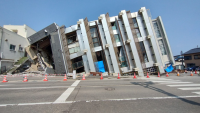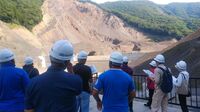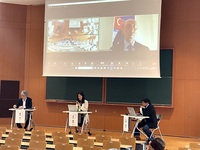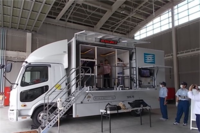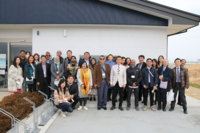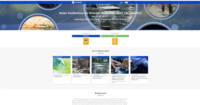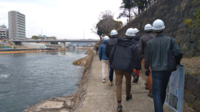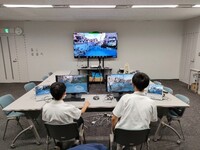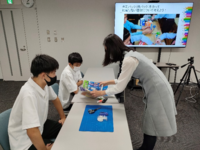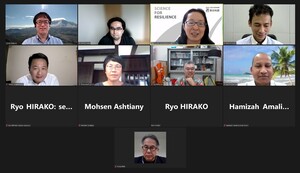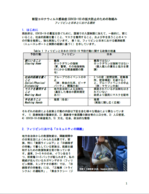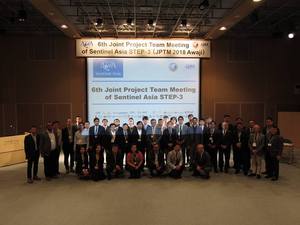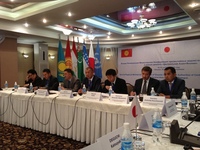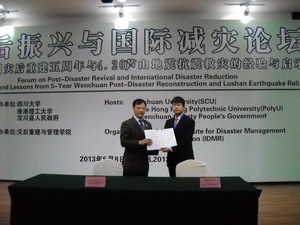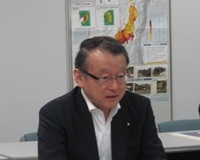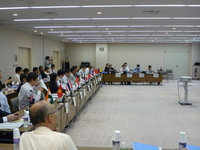10 - 12 March 2023 (Sendai, Japan hybrid with online)
Reports on Session 1, 2 and 3 of the Asian Conference on Disaster Risk Reduction 2022 (ACDR2022), which took place in Sendai, Japan, in March 2023.
<Session 1: Large-Scale Disasters and Countermeasures>
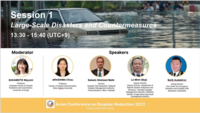
This session shared information on the current situations of large-scale disasters and the responses to them. Disasters are intensifying around the world due to the climate change, increasing economic damages caused by the progress of urbanisation and impacts of the cascading and compounding risks. Furthermore, the session provided an opportunity to learn about disaster risk management (DRM) systems, including a more effective pre-disaster investment in DRR and DRM measures.
Dr SAKAMOTO Mayumi (Professor, Graduate School of Disaster Resilience and Governance, University of Hyogo) moderated this session. In her introduction, she stressed the importance of improving the countermeasures for large-scale disasters. Water-related disasters are getting more frequent and intense, such as seen in the unusually prolonged floods that occurred in Pakistan in 2022. Earthquakes, such as those in Turkiye and Syria in February 2023, have unknown dynamics and unpredictable occurrence. It was noted that the impact of these disasters often cross national borders affecting people living in different countries.
Dr ARASHIMA Chizu (Professor, International and European Union Law, Faculty of Global Communication, Kobe Gakuin University) presented the issues in transboundary disaster governance from the perspective of international law. She highlighted the importance of science-based data in negotiating treaties or bilateral agreements between countries on addressing transboundary disasters.
Mr Saleem Shahzad Malik (Director, Disaster Risk Reduction, National Disaster Management Authority, Prime Minister's Office, Pakistan) presented the disaster risk reduction and climate change adaption activities in Pakistan. In particular, the government is strengthening its disaster management system to address extreme events such as the prolonged and devastating floods in 2022. Additionally, the government has been adopting new technology in disaster risk management as well as utilising scientific data to further enhance its disaster risk reduction strategies.
Dr Le Minh Nhat (Deputy Director, Department of Natural Disaster Response and Recovery, Vietnam Disaster Management Authority, Ministry of Agriculture and Rural Development, Vietnam) presented an overview of the disaster risk management system in Vietnam. He said that flood is the most frequent type of disaster in the country. To address this, major financial and structural investments have been promoted in flood control and management. In fact, the National DRR Plan 2021-2025 puts greater priority in implementing flood control projects.
Mr Serik Aubakiro (Acting Director, Center for Emergency Situations and Disaster Risk Reduction (CESDRR)) introduced roles and functions of CESDRR, which is a permanent intergovernmental body to help address transboundary disasters and emergencies. CESDRR was established through the agreement between the Government of the Republic of Kazakhstan and the Government of the Kyrgyz Republic to achieve the following objectives: 1) cooperation in disaster risk reduction, prevention and elimination of emergency situations; 2) mitigate factors of disaster risk, identify, assess, forecast and monitor emergency situation hazards; 3) coordinate mutual efforts and strengthen preparedness for effective and timely response to emergencies; 4) implement regional and international cooperation in DRR and emergency management; and 5) increase the safety of life activities of the population during natural and man-made disasters.
Dr Sakamoto, in her conclusion of the session, acknowledged that this session made clear that information sharing between countries of origin of the disaster and countries affected by that disaster is critical in mitigating transboundary impacts. However, despite the urgency required for information sharing as disaster response, there is no practical international communication system that can be used in emergency situations, since techniques and rules for natural disaster monitoring vary from country to country. One of her suggestions is to establish an international risk communication system among relevant organisations to enhance transboundary disaster risk management.
<Session 2: Broaden Our Horizons for Disaster Data Linkage in SFDRR Implementation: Application of GLIDE (GLobal IDEntifier Number)>
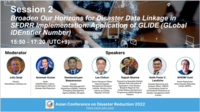
This session reviewed the current status of the disaster data management in Asia and introduced some tools and practices to effectively deal with the data collected from wide range of stakeholders. It aimed at contributing to the Sendai Framework for Disaster Risk Reduction (SFDRR) Target G-5: Number of countries that have accessible, understandable, usable and relevant disaster risk information and assessment available to the people at the national and local level.
Mr Julio Serje (Consultant, ADRC and Director, RobotSearch Software Inc.) moderated this session. In the introduction, he emphasized the challenges relating to disaster data management in disaster risk reduction. There are still gaps among stakeholders on how damages and losses data are managed. On the other hand, most of the disaster data just remain aggregated and not put into use. These challenges exist on top of the fact that disaster data is getting more complex, and therefore, it is important to promote the establishment of linkages among the various data management tools existing in the Asian region.
Dr Animesh Kumar (Head, UNDRR Office in Bonn, United Nations Office for Disaster Risk Reduction) reported the progress in monitoring the SFDRR. He informed that as of February 2023, the cumulative number of countries using Sendai Framework Monitor (SFM) to report on DRR progress amounted to 156. The SFM targets and indicators are also finding application in several intergovernmental processes, while the data has helped reporting on SDGs and are being used by partner organisations in thematic reports and programmes. The challenge in reporting is that developing countries, especially LDCs and SIDS, are struggling to provide data to all targets and all indicators for the SFM. To help advance monitoring, new models and tools are being developed particularly in tracking of disaster losses and damages. The new model is expected to link climate-related variables, losses and damages, and disaster events.
Mr Demberelnyam Baasansuren (Director, Risk Management Department, National Emergency Management Agency (NEMA), Mongolia) presented the practices and challenges of disaster data gathering and sharing in Mongolia. One of those practices is the Spatial Information System that NEMA established in 2019 in order to share hazard information nationwide. Among the challenges in data gathering are barriers in distributing the registration templates and guidance to respective stakeholders for raw data collection. In addition, the human and technological capacities are insufficient to provide an understanding on the necessity in collecting and generating reliable data. As way forward, NEMA will strengthen knowledge and understanding of data disaggregation and its importance through training and other outreach activities.
Dr Chihun Lee (Senior Research Officer, National Disaster Management Research Institute, Ministry of the Interior and Safety, Republic of Korea) talked about the international cooperation on disaster risk reduction focusing on early warning systems for floods. He highlighted the cooperation project carried out with the Philippine government to install flood early warning systems putting emphasis on communication protocols.
Mr Rajesh Sharma, (Programme Specialist (Global) Disaster Risk Information and Application Crisis Bureau, Bangkok Regional Hub United Nations Development Programme, Bangkok, Thailand) introduced UNDP's Digital Disaster Risk Reduction Maturity Model (DDRRMM). This is a tool that diagnose the maturity of the digital ecosystem of disaster risk reduction and management practices. In developing this tool, UNDP conducted an in-depth analysis of national disaster database systems to support the new generation of disaster data and information systems in line with the level of digital maturity of each country. He highlighted the importance of digital and data governance for DRM, and this needs to be promoted through legal and institutional frameworks, policies, strategies, action plans, and practical guidelines.
Mr Keith Paolo C. Landicho (Disaster Monitoring and Analysis Officer, ASEAN Coordinating Centre for Humanitarian Assistance on Disaster Management) presented the evolution of the ASEAN Disaster Information Network (ADINet), which is a repository of information on hazards and disasters that occurred in Southeast Asian region. ADINet has two types of linkages. One of them are "existing linkages" that include: linkages for validation, linkages for research application, and linkages for coverage. The others are "external linkages" that include: linkages for integration and linkage for enhancement. ADINet's linkage with GLIDE fits under the linkages for integration.
Dr SHIOMI Yumi (Senior Researcher, Asian Disaster Reduction Center (ADRC)), presented the GLobal disaster IDEntifier (GLIDE) improvements, particularly on open governance and better functionality. In terms of governance, a steering committee was established in 2021 as well as the three subcommittees: API, SOP, and New Product Development. In terms of functionality, two new manuals were drafted and crowdsourcing was introduced in 2022 to allow users to report "missing disasters in the GLIDE database." Linkages of GLIDE with other disaster data management tools have been constantly coordinated, such as linkage with Reliefweb, Sentinel Asia, UNOSAT, ADINet, and ESCAP.
The session featured the challenges for collecting, reporting and sharing disaster data and the practices to manage it effectively. While the number of countries that reported its progress of implementing the SFDRR has increased, it was found that there are still gaps in data collection and management at national and local levels. To address these challenges, various tools have been developed by stakeholders. Linkages of various data management tools need to be promoted.
<Session 3: The Provision of Information via Satellite for Disaster and Crisis Management>
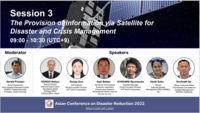
This session provided an overview of the utilization of the Quasi Zenith Satellite System (QZSS) for disaster and crisis management (DC Report). It also presented the outcomes of QZSS DC Report demonstrations in some countries.
Dr Gerald Potutan (Senior Researcher, ADRC and Visiting Associate Professor, Kobe University) moderated this session. In many remote, mountainous, and island areas in Asia, people have limited or no access to internet or cellular communications. Oftentimes, the warning information to evacuate does not reach the people at risk. Providing the warning information via QZSS helps address this challenge. It directly transmits the message to: 1) individuals with receivers/terminals; 2) outdoor electronic facilities/boards; and 3) ground receivers that activate community alarms (e.g., siren and beam lights).
Mr HONGO Nobuo (Deputy Director, National Space Policy Secretariat, QZSS Strategy Office, Cabinet Office, Japan) explained about the Satellite Report for Disaster and Crisis Management (DC Report) which is one of the services under QZSS. With this service, disaster management agencies can provide warning information via QZSS satellites to communities-at-risk even in the absence of internet or cellular services. As of December 2022, approximately 390 products are compatible with QZSS. Using some of these products (smartphone apps), demonstrations of QZSS utilization were conducted in Australia, Fiji, and Thailand.
Ms Runjie Gou (GIS Engineer, Social Innovation Division, NTT DATA Corporation) presented the outline and progress of the QZSS Project, which is jointly implemented by five partner organizations: Cabinet Office of Japan, NTT Data Corporation, Keio University, PASCO Corporation, Asia Air Survey, and ADRC. Ms Gou said that the main purpose of the project is to create a system using the QZSS DC Report service that is tailored to each country's needs and environment as well as to conduct QZSS DC Report Demonstrations before it officially starts operation in 2024. In the demonstrations, the project will identify requirements and issues for deployment of the system.
Dr Hasi Bateer (Hasi Lab Director, Advanced Technologies Research Laboratory, Infrastructure Systems Development Center, Asia Air Survey, Co. Ltd.) reported the outcomes of feasibility study for disaster information system using QZSS. The study covers 21 countries in Asia and Pacific region, and investigated the following: 1) conditions for receiving QZSS, 2) specific disaster cases and issues; and 3) Early Warning System implementation needs. The outcomes highlighted information transmission issues, including: distortion of information as it passes through many channels; delayed arrival of information; and limited coverage of telecommunications network. In order to have an effective transmission of warning information, the study recommended that following characteristics must be present in the information system: robustness, immediacy, correctness, and comprehensiveness.
Mr ICHIKAWA Ryunosuke (Assistant Manager, Social Innovation Division, NTT DATA Corporation) presented results of QZSS validations conducted in Thailand, Fiji, and Australia. In the Thailand, the scenario was forest fire. By using QZSS, rangers were able to receive information directly from QZSS wherever they are in the park. In Fiji, the scenario was tsunami, and station devices were able to receive the transmission of QZSS and then further disperse the information by low power wide area network (LPWAN). In Australia, the scenario was bushfire. Information from QZSS were received through smartphones. Following up on this promising result, the next demonstration will be on a more practical application including residents to receive messages on mobile terminals by using different communication methods (e.g., Wi-Fi, LPWAN, and Bluetooth).
Ms Vasiti SOKO (Director, National Disaster Management Office (NDMO), Fiji) mentioned that one of the reasons for using QZSS in Fiji is due to its location in the Pacific Ocean, situated in between Vanuatu and Samoa which are also disaster prone countries, thus the disasters in these countries having a strong impact on each other. Also, the risk communication system is still limited in Fiji. Since NDMO Fiji is strengthening its disaster management system including early warning system, the utilisation of QZSS DC Report service in Fiji is a welcome endeavor.
Mr Socheath So (Senior Technical Officer, The National Committee for Disaster Management (NCDM), Cambodia) introduced Cambodia's disaster risk management information system called Platform for Real-time Impact and Situation Monitoring (PRISM). This platform links the field assessment information, early warning systems, satellite data, baseline population, and socio-economic vulnerability data to effectively measure the risk and its impact. QZSS is expected to augment the PRISM by providing warning information transmission system that is tailored to the local environment.
(2023/03/22 15:00)


